THE PLOT: Bill (David ‘Let’s Murder Vivaldi‘ Sumner) and Jean (Joan ‘The Love Box‘ Alcorn) are your archetypal middle class suburban marrieds with the requisite two kids. He’s busy, she’s fed up, so they get an au pair (Sibylla ‘Vampire Circus‘ Kay) in. Or if you prefer, ‘they found a treasure – beautiful, French and just a little disturbing. Her name was… Monique!’ The results could best be described using a French number conjoined with the word ‘ménage’.
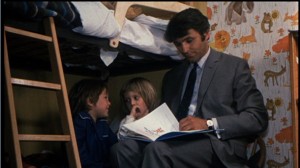 |
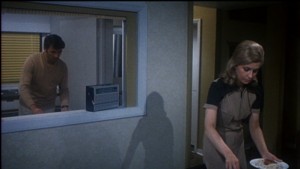 |
We open on – breathe in, now – the half-empty car park of a suburban railway station. Now, it’s possible some of you out there aren’t as mad on grainy, washed-out footage of nondescript areas of forty-year-old suburbia as we are. You are, of course, entitled to your opinion, but we must warn you right now that such a questionable stance may severely impair your enjoyment of both this film and this article, such as it is. It’s all about that public information film anti-glamour, this picture, and as we know it’s the mundane trimmings that are the most evocative. Stuff like Marc Bolan’s jumpsuit or a great big hovercraft are fair enough, but a Festival of Britain-style litter bin with the wooden panelling round the sides, with a solitary Aztec wrapper in the bottom, will transport you back in time with infinitely more evocative force. Every macramé pot holder is a portal to the past, every Ronco Buttoneer a TARDiS.
Now, to the strains of some slightly classy weepy piano, putting the classically-trained viewer in mind of Satie and the rest of us of a posher version of the bit at the end of The Incredible Hulk, we see Jean watching her small kids at play on good old, never-did-us-any-harm-your-honour solid tarmac. Lingering close-ups of her slightly deadened expression attest to Something Missing in Her Life. Bill, her Ed-Stewart-voiced, on-the-verge-of-going-a-bit-craggy, could-model-for-one-of-the-cheaper-trouser-catalogues, would-have-smoked-a-pipe-if-this-was-a-decade-earlier hubby picks them up in the car. A Euro dolly manhandles some tots nearby, and a light bulb flicks on in Jean’s head. ‘That’s what I want – an au pair!’
So they get one – who turns out to be a Swedish frump in a pixie hat, with an awkward, taciturn manner. She’s a slovenly waste of space, helping herself to massive sarnies and generally being a nightmare stereotype, and as such is soon shown the door. Bill takes Jean’s mind off things with a bunch of chrysanths and some rubbish ‘nibbling southwards’ sexy overtures. Jean sighs. ‘So this is what the flowers were for!’ Jean is quite lovely, in that old school middle class manner – a bit Deneuve about the chops, and thoroughly Lumley of voice. ‘Jean’, though, what a dated name.
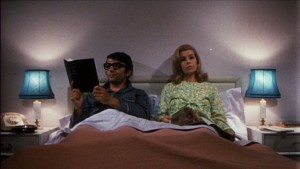 |
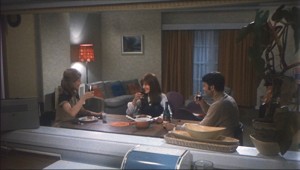 |
Barely a decade after this was made, ‘Jean’ had become the appellation of choice for ageing-yet-feisty heroines of denture fixative ads. (‘Fillet steak, Jean?’ ‘Do you think they do an omelette?’) Mind you, the name Joan’s even more antiquated, so bang goes our moniker carbon dating theory. Naturally, housewifery is boring the Last of the Jeans to death. By way of demonstration, she moons abo ut in a cloche hat and those great big owl sunglasses we’ve seen before in both Boom! and Bunny Lake.
Finally Monique – brunette, angular chops, Françoise Pascale-style quizzical self-confidence in spades – moves in, as that white telly blares out one of those hastily-mocked up programme soundtracks you get in films of a certain vintage – one voice babbling unintelligibly augmented by random washes of audience laughter. The front room is aesthetic heaven for fans of low-rent open plan chic, with its riser-less black staircase, big white telly and leatherette swivel chairs. Monique, it transpires, is doing a course in interior design at the local poly, and is no doubt picking up tips on that grim-trendy look already.
Bill, meanwhile, is taking a swift University of Life course in Monique’s Arse Studies. As Jen gets to know the girl, chatting fart about France, he stands about in a horse-frighteningly loud plaid dressing gown and snatches quick glimpses of her bending over as he queues for the bog. Significant dialogue is exchanged with Jean. ‘Don’t mess things up.’ ‘Is that likely?’ ‘More than likely, knowing you!’ But he’s not the only one sizing things up. As he arrives home from work – again with flowers, that front room must be thick with a permanent haze of Impulse – he happens upon the pair having uncontrollable giggling fits in the bedroom. ‘We’ve been swapping clothes!’ Bill frowns.
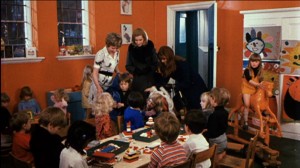 |
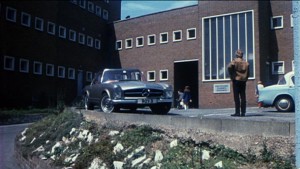 |
Later Monique’s bloke Richard turns up, bearing an even bigger bunch of flowers. He takes her, still wearing Jean’s nightie and not much else, out to what you could still just about get away with calling a groovy nightclub. Trendies frug the remainder of the sixties away to a song about ‘walking down the street’, but jump cuts of Monique gazing listlessly about suggest she’s not having a whale of a time. They split (as people are just about to stop saying), and Monique hares recklessly about the town in Richard’s car. She feels so alive!
Cut, by way of contrast, to Jane rattling fabric through a deafening Singer sewing machine while an increasingly frustrated Bill sneaks a Butcher’s at her legs under the table. She’s having none of it, though. ‘No, not tonight. I don’t feel like it. I don’t see why you should get all sexy over her and take it out on me!’ The cat’s creeping out of the carpet bag, and Bill’s off on one. ‘You never do feel like it! Never!’ Meanwhile Monique and Dickie somehow manage to sneak into Craven Cottage, turn the floodlights on and have a daft kickabout before the police turn up in the traditional nee-nawing Ford Zephyr. It’s clear where the carefree, dizzy fun is to be had tonight.
The girl knows when to stop though, and tells Richard to bog off when they get back to Bill and Jean’s house. Bill is, unsurprisingly considering what hasn’t been happening tonight, still awake, and catches Monique creeping in. A bit of ‘help me get these decade-signifying white thigh boots off’ horseplay turns into a bit of sensual hair touching, which becomes a snog, which rapidly spirals up into a full-on shag, with Monners on top and litres of glycerine sweat applied to brows. It begins!
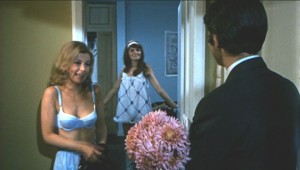 |
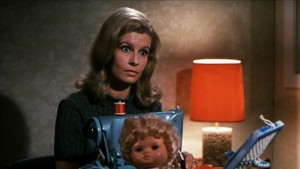 |
After that, what else but a ‘life goes on’ montage of Bill going to work, Jean cleaning and Monique skipping about the big, boxy polytechnic building, all linked with some retro-even-then horizontal wipes. It’s all building up to the big sexual tension scene, which begins in the front room with Jean pinning a dress on Monique while Bill catches sly glances of leg again. ‘Isn’t that a bit short?”Not for you!’ The fitting turns into a bit of an all-round Jean-on-Mon feel-up. A festive feel-up come to that, as the lounge is now dominated by a lovely old Christmas tree – a real one, but ficking drowning in clumps of loose blue and silver tinsel, as was the style at the time. It’s a heart-warmingly familiar scene – er, feelings-up aside. In fact, all that’s missing is… yes, a little box in the corner of the screen bearing the price of the tree! Of course! It’s a Woolworth’s Christmas ad come to life! All that’s missing is Anita Harris and a brace of Cossack dancers capering round the Bontempi.
Instead, of course, the screen is dominated by the ongoing edition of three-way family favourites. Bill is now pulling a ropey Santa outfit together – cotton wool lump on chin, orange dressing gown the nearest he can get to a coat – and while he’s in the basement dusting off his wellies, the girls turn a present wrapping exercise into a crafty snog. When he returns, Jean shows irritable remorse for this, fretfully smoking a ciggie and swivelling about on that Parkinson’s guest chair. More clandestine nookie opportunities are grabbed while Bill’s filling the kids’ stockings.
They swing in perfect solitude, in a scene made all the more effective for its complete lack of dialogue, music and, indeed, quite often any sound at all. It’s accepted that any film buff worth their salt thinks film soundtracks (proper, orchestrally scored ones, that is) are always A Good Thing, but we’re Reynolds Girls-esque cultural Philistines, and more often than not they bore and annoy us in equal me asure. So it’s great to see a sequence like this, that makes a big pot of sonic sod all go a long way. Granted, this may be down to budgetary gnat’s chuffitude rather than any artistic decision, but the point holds.
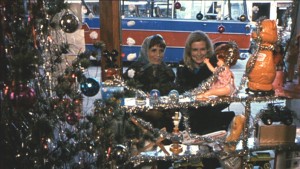 |
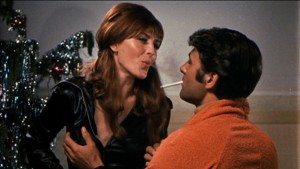 |
And so to bed. Jean’s still in shock, but one thing’s changed – now she actually fancies it with her husband. Cue – and oh, after we’d just been celebrating this film’s lack of tricksy frippery! – a two-minute dissolve-a-montage of Jean’s orgasming face. Now, this film is forever being bracketed with the pre-Confessions ‘saucy suburbia’ strain of cheap-‘n’-tatty Brit cinema alongside such queasy fluff as The Yellow Teddybears and The Wife-Swappers, but unlike those tawdry efforts, Monique is – relatively, at least – rather cosy and quaint. It’s not out to shock with lurid exposés, and consequently the sauce quota is well below the genre’s meagre average. Hence this sort of above-the-shoulders montage. Tasteful, like. Although it don’t half bloody go on.
Flash forward to the day after Twelfth Night, and Monique and the kids are out in the back garden burning the Christmas tree, though with all those fags and non-fireproof tinsel knocking around, it’s a miracle the thing didn’t go up sooner. While she capers about with a can of petrol in a tempting headscarf/Aran sweater/micro mini combination Jean, now in the nightie she leant out earlier, is knocking about in the kitchen. The kitchen is, as you’d hope, a visual joy, all fitted melamine units in squared-off olive and white, with the obligatory eye-level grill, opening out onto the dining room via a panoramic five-foot serving hatch. Mister Barratt has built his dream house, for sure.
All concerned have a spring in their step, for reasons it doesn’t take Mariella Frostrup to divine. Bill wants to take Jean for a drink. ‘Take Monique instead!’ Free and easy is her new middle name. And so he does. on the way there, Monique prats about on top of a bollard and waxes philosophical about domestic tragedy. ‘The children burnt your broom…that’s the price you have to pay I suppose.’ Now they’re up against a chain link fence and a bit of sultry double-bass-and-drum-brushes jazz kicks in, to evoke that heady ‘forbidden lust in afternoon suburbia’ atmos in the only way any musician knew how before Jarvis Cocker came along.
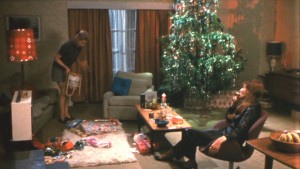 |
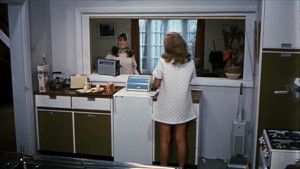 |
This sort of thing can’t continue in this agreeable fashion for much longer though, and sure enough one day Bill turns up at home earlier than expected and catches the pair of them at it hammer and tongs. In a pleasingly weird comedy moment, he panickingly blurts out ‘forgot my wallet!’ and dives into the wardrobe. Later, while Monique tries to mollify Jean in the bathroom with a spot of continental sexistentialism (‘he has no reason to complain… if he can, why cant you?’) Bill drowns his sorrows in the pub and picks up a tart for a confessional shag. Said tart turns out to be failed auditioner for the title role Carol ‘Carry On‘ Hawkins, but before any ends can be got away he has a change of heart and pegs it back to the house. ‘I must have it out with her!’
Now for the big scene. Monique, feeling guilty, cooks a slap-up dinner for the warring couple. As they sit in smouldering silence, she recommends they go and see ‘a very sexy Swedish film’. No dice. In waft the strains of that Incredibly Sophisticated Hulk piano lilt, though now it sounds more like the plaintive Yellow Pages music. (‘Hello, French polishers…?’) Monique stands up and snogs Bill full on at the table. Jean looks aghast. Then she slowly crosses over and snogs Jean, and the world’s monocles are launched from their ocular eyries into gravity’s merciless embrace. The girls go upstairs and Bill runs after – returning for a bottle of wine. The Big Scene unfolds in a series of relatively tasteful lesbian jump cuts, augmented with Bill in the foreground fortifying himself for the big push with wine and fags. ‘Come on, Bill!’ ‘I will in a minute!’
Then, in one of the most heart-warming scenes in a tawdry British sexploitation film – well, all right, the only heart-warming scene in any British sexploitation film – the three share a post-coital fag while debating the aesthetic merits of ‘Monolith’, a swirly orange abstract painting on the bedroom wall. Bill loves it. Jean and Monnie reckon it’s hung upside down. And so it’s re-hung the other way up. It’s a knee-in-the-balls bit of symbolism, but it’s so quaintly done, it works. After a bit of horseplay in an F-reg Austin 1100, Monique, considering her work done, naffs off back to France and leaves the renewed couple to get on with it. Bless! It’s the same sort of ending as Twinky, though the difference is this time you’re on the verge of giving a toss about the protagonists.
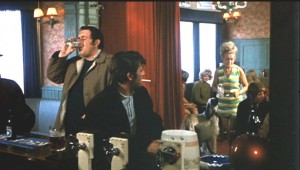 |
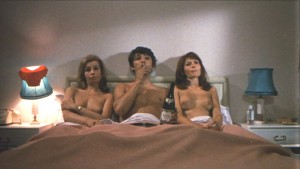 |
This is, you’ll be unsurprised to learn, a Tigon Production. (‘Watch it! It’s a Tigon! They’re strange creatures. They disappear and make films. Then suddenly… they’re upon you!’) As such, a suspicion of cashing in on the Killing of Sister George lesbo taboo bandwagon lingers over proceedings. But this doesn’t, for once, have the Clark-Gable-meets-Bruce-Forsyth countenance of production supremo Tony Tenser looming over it. Aside from a change of title from Bown’s less-than-come-hither choice of North East Confidential and a few choice Tenserian publicity tags (‘Does *your* marriage need Monique?’) this is, soup to nuts, an auteured work from the mind of Mr Sibylla Kay, John ‘Commander Stafford, you know, the Lethbridge-Stewart-like meddling government mole off of late-period Doomwatch‘ Bown.
He does a sterling job with what must be all of one Bolex camera, two lights and a broken pallet at his disposal (51 grand is the estimated all-in budget), but sadly he never see ms to have had a chance to do anything else along these lines (a promising-looking Bown-penned ‘British road movie’ called Hey You was turned down by Clark Forsyth). While he went to the wall, the likes of Mike ‘Come Outside’ Sarne got to go to Hollywood and piss big money away on overwrought silliness, which is just one more injustice in the annals of film history, we suppose. (Incidentally, we were going to represent nascent sexploitation in this series with Sarne’s tricksy meisterwerk Joanna, but we couldn’t get hold of a copy and so plumped for this as second choice, and we’re rather glad it worked out that way, in retrospect.)
This is, in short, pretty much the only sexploitation film which is genuinely likeable for what it is, rather than for how man ailing comedians are cameoing or how amusingly bad the gags are. It’s all down to attitude – while the prurient exposés that preceded it were full of tabloid ‘phwoooar – er, I mean, tut!’ leering disgust, and the comedies that followed were just full of leering, this is much more relaxed and comfortable about ‘it’ – but still in a very conservative way, of course, with its yearning ‘stifled British marriage saved by liberated interventionist Eurototty’ undertones.
And unlike the drably mechanical majority, it’s full of nice little realistic comic touches (Bill’s wardrobe panic, one of the coppers at Fulham taking a sneaky penalty kick). In short, it actually works upstairs, not, er, down inside. ‘If you only watch one…’ as they say. Although please don’t take that as an obligation.


















George White
September 10, 2016 at 9:40 pm
not as star-studded as Au Pair Girls – with John Lemesurier, Richard O’Sullivan, Gabrielle Drake and Nancie Waite – not the costume designer of DUkes of Hazzard, but apparently last made a fil with 1996#s Candidate Kid.
George White
May 22, 2023 at 5:10 pm
Just watched this grotty, ratty thing. Ludicrously overaged lead.